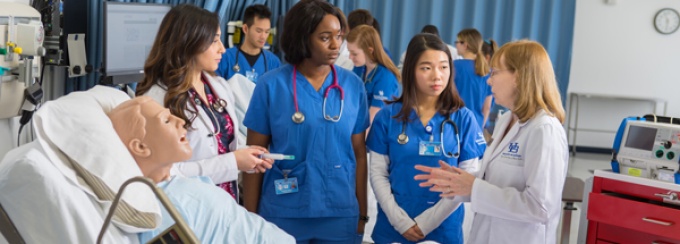Undergraduate Nursing Programs
Our three distinct undergraduate programs prepare future and current nurses to thrive in their career and to confidently provide the highest level of care.
The University at Buffalo School of Nursing baccalaureate programs are accredited by the Commission on Collegiate Nursing Education (CCNE). Our highly competitive programs are designed to prepare students for the expanding role of professional nurses and the challenging work environments of contemporary nurses.
On this page
| I am a... | I want to... | Program |
|---|---|---|
| High school student | Become a registered nurse | Traditional BS |
| College student or have some college credit | Become a registered nurse | Traditional BS |
| Current UB undergraduate student | Become a registered nurse | Traditional BS |
| College graduate with a bachelor's degree (non-nursing) | Become a registered nurse | Traditional BS Accelerated BS |
| Graduating college senior (non-nursing major) | Become a registered nurse | Accelerated BS |
| Registered nurse with an associate degree in nursing | Advance my nursing education to the bachelor's level | RN to BS |
Domain 1: Knowledge of Nursing Practice
Demonstrate the ability to integrate, translate, and apply comprehensive nursing knowledge and innovative practices to make informed clinical judgment and provide safe, high-quality patient care in diverse clinical settings.
Domain 2: Person-Centered Care
Provide patient-centered care that respects individual and cultural preferences, values and beliefs to ensure the delivery of compassionate, coordinated care.
Domain 3: Population Health
Utilize knowledge, skills and values to contribute to improving population health outcomes and addressing health care disparities.
Domain 4: Scholarship for the Nursing Discipline
Formulate, synthesize, translate, implement and disseminate evidence-based practice to improve and transform health outcomes.
Domain 5: Quality and Safety
Integrate quality improvement and patient safety strategies into nursing care to optimize patient outcomes and minimize harm.
Domain 6: Interprofessional Partnerships
Collaborate with other healthcare professionals and interprofessional teams to share information and deliver safe, high-quality, patient-centered care.
Domain 7: Systems-Based Practice
Navigate complex health care systems where professional and organizational values are aligned to predict change, employ improvement strategies, and effectively utilize available resources.
Domain 8: Informatics and Healthcare Technologies
Utilize informatics and healthcare technologies safely and effectively to enhance patient care, improve health outcomes and support clinical decision making.
Domain 9: Professionalism
Cultivate a professional nursing identity grounded in ethics, accountability, and lifelong learning to optimize patient care and outcomes.
Domain 10: Personal, Professional, and Leadership Development
Foster transformational growth by practicing self-care, committing to professional development, building leadership skills and a capacity for resilience.
The University at Buffalo School of Nursing delivers an exceptional value in nursing education, recognized nationally for its excellence. Our undergraduate programs hold accreditation from the Commission on Collegiate Nursing Education (CCNE), ensuring the highest standards in nursing education are met. We proudly boast a first-time NCLEX-RN pass rate that surpasses both state and national averages, demonstrating the effectiveness of our curriculum.
Ranked in the top 20% of nursing schools nationwide and as the highest-ranked program within both the SUNY and CUNY systems, our school is a leader in nursing education. Additionally, all our undergraduate students engage in comprehensive training through the Institute of Healthcare Improvement (IHI), covering key areas such as improvement processes, patient safety, leadership, and person- and family-centered care. This prepares our graduates not only to excel in their careers but also to lead in the transformation of healthcare.
Please contact:
Office of Student Services
nursing@buffalo.edu
The University at Buffalo is committed to ensuring equal access to its programs and activities. View UB's Notice of Discrimination here.
